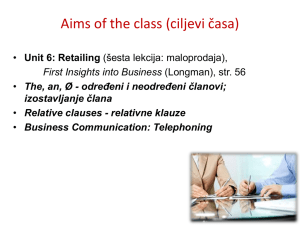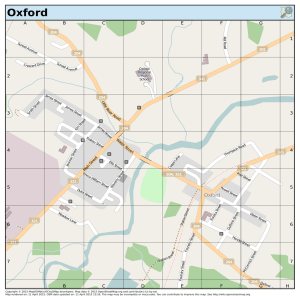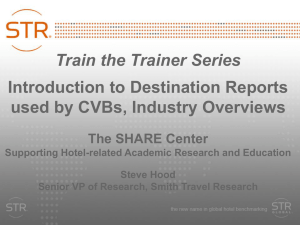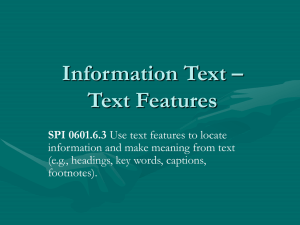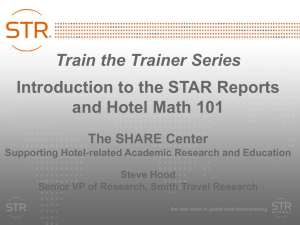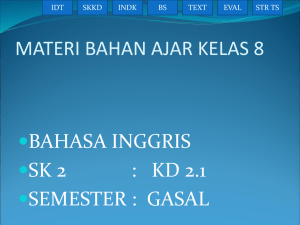Rešenja zadataka
advertisement
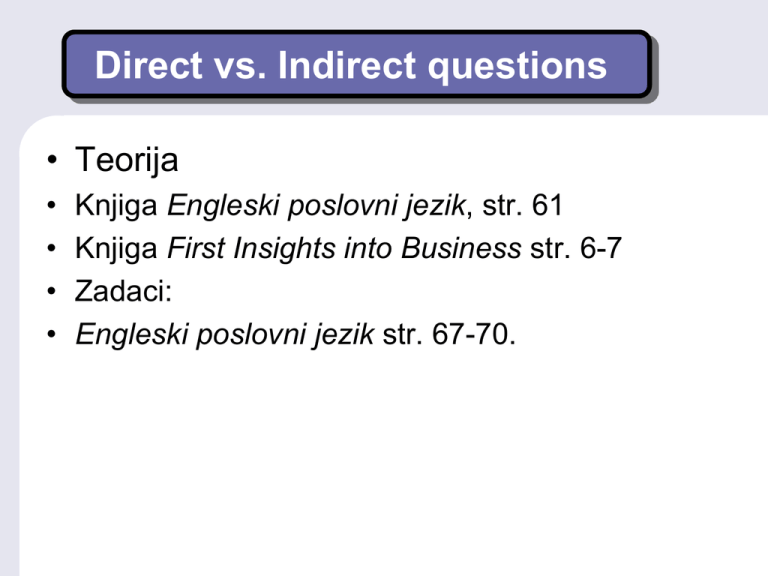
Direct vs. Indirect questions • Teorija • • • • Knjiga Engleski poslovni jezik, str. 61 Knjiga First Insights into Business str. 6-7 Zadaci: Engleski poslovni jezik str. 67-70. Direct Questions Exercise • ZADATAK 1. str. 68 knjiga Engleski poslovni jezik 1. What 2. When(or)What time 3. Why 4. Which 5. Where 6. How 7. When 8. Where 9. What 10. Where 11)What 12)Why 13)What 14)When 15)Where 16)How 17)When 18)Where 19)When 20)How ANSWER KEY Direct Questions Exercise • ZADATAK 3. str. 68 knjiga Engleski poslovni jezik ANSWER KEY LONG DO ARE ANY ANY Indirect Questions Exercise • • • ZADATAK 6. str. 69 knjiga Engleski poslovni jezik ANSWER KEY Primer: "What's this?“ "Do you know what this is?" 1. …where the station is? 2. …if you are coming to the party? 3. …how it works? 4. …the matter is? 5. …where you are from? 6. …how long it takes? 7. …whether she has reached a decision yet? 8. …when/(at) what time you are leaving? 9. …whether Anne knows about computers? 10. …how you (to get) get to the post office from here? 11. …what you are doing...?! 12. …you could lend me 50 Euros? 13. …you could take me to the airport? 14. … Susana likes classical music? Indirect Questions Exercise • • 1. 2. 3. ZADATAK 7. str. 69 knjiga Engleski poslovni jezik ANSWER KEY Can you tell me what your weaknesses are? Would you like to tell me how you have changed in the last 5 years? Could you tell me what your current salary is? JOB INTERVIEW AT IKEA Present Simple Tense • Vežba 31. str. 78-79, knjiga Engleski poslovni jezik • • • • • • • • • • doesn't like (does not like) live studies eat do not work use don't do (do not do) doesn't walk (does not walk) teaches speak Present Simple Tense • • • • • • Vežba 32. str. 79, knjiga Engleski poslovni jezik I watch TV. We play football. It is boring. She cleans her room. You ride your bike every weekend. • • • • • • Vežba 33. str. 79, knjiga Engleski poslovni jezik Does she collect stickers? Do they play a game? Does the cat sleep in the cat’s bed? Does she often dream? Does he play streetball? Present Simple Tense • 1. 2. 3. 4. 5. 6. 7. 8. 9. 10. 11. 12. 13. 14. 15. 16. 17. 18. 19. 20. Vežba 34. str. 79-80, knjiga Engleski poslovni jezik swim collects sing works sit open speaks likes listen cleans play washes does watch wake up go carries teaches tell flies PREPARE YOUR BOOKS! • NEW TENSE! Present Continuous Tense str. 4244 (teorija) • Present Simple vs.Present Continuous Tense, knjiga Engleski poslovni jezik, str. 40-43 (zadaci); Present Continuous • 1. 2. 3. 4. 5. 6. 7. 8. 9. Vežba 39, str. 81, knjiga Engleski poslovni jezik am looking for is printing out are taking care is wearing is meeting am not working is not talking ... are you doing? ...is Mr. Bradley staying? A Trekking Journal - SOLUTIONS • • • • • • • • • • • • • • • • • • • • • • • • • • Vežba 40, str. 81-82, knjiga Engleski poslovni jezik 1. is 2. are shaking 3. are really killing 4. are bleeding 5. still want 6. is 7. am trying 8. am learning 9. do not learn 10. do not understand 11. am gradually improving 12. am currently travelling 13. is 14. is always walking (irritating behaviour) 15. complaining (irritating behaviour) 16. am doing 17. is sitting 18. are discussing 19. do not know 20. just calls 21. speaks 22. is trying 23. says 24. tries 25. also seems MOUNT ANNAPURNA • • • • • VERY TIRED VS. ABSOLUTELY EXHAUSTED EXHAUSTED A GREAT DEAL A LOT TO BECOME BETTER IMROVE DIFFICULTY A PROBLEM TO HAVE DIFFICULTY (IN) DOING SOMETHING TRY AS HARD AS • TO DO ONE’S BEST TO ONE CAN Present Simple vs.Present Continuous Tense • Vežba 41, str. 82, knjiga Engleski poslovni jezik 1. 2. 3. 4. 5. 6. 7. 8. 9. 10. AM WORKING WANTS IS STAYING ARE YOU DOING DON'T BELIEVE YOU AM STUDYING (FIXED FUTURE ARRANGEMENTS) ARE GOING (THEY INTEND TO DO IT IN THE FUTURE) IS RAINING RAINS IS HAVING Present Simple vs.Present Continuous Tense, knjiga Engleski poslovni jezik, str. 83, zadatak 42 play is finishing enjoy prefer know waiting am interviewing works is talking seems Modal Verbs (modalni glagoli) str. 37, Engleski poslovni jezik (teorija), str. 85-86 (zadaci 49. i 50.) Modal Verbs (modalni glagoli) could mustn’t should should should May/Can I...? (may-too formal) shouldn’t could may should can’t may (might less than 50%) could not (couldn’t) will / should can/may/might would (the second conditional) ought TO could must must str. 85-86 (zadatak 49) Modal Verbs (modalni glagoli) needn’t / may not/might not can should mustn’t will not (won’t) str. 86 (zadatak 50) Past Simple Tense Zad. 69, 70 i 71, str. 96-97 – ONLY FIRST FIVE SENTENCES 69. zadatak 1. He answered the question. 2. You asked a question. 3. The dog barked. 4. They called us. 5. We climbed a mountain. Past Simple Tense Zad. 69, 70 i 71, str. 96-97 – ONLY FIRST FIVE SENTENCES 70. zadatak 1. They didn’t collect postcards. 2. You didn’t jump high. 3. Albert didn’t play squash. 4. The teacher didn’t test our English. 5. Fiona didn’t visit her grandma. Past Simple Tense Zad. 69, 70 i 71, str. 96-97 – ONLY FIRST FIVE SENTENCES 71. zadatak 1. Did Anna open the window? 2. Did she walk home? 3. Did you work in the garden? 4. Did you sing a song? 5. Did she sit on the chair? Zadatak 72., str. 97 spent was travelled (page 45, at the top) visited went learnt / learned were didn’t rain saw ...did you spend? Zadatak 73., str. 97-98 started ordered sent received came gave left arrived didn’t get wasn’t Did Sarah go...? Did you ring...? Past Simple Tense past continuous (preterit trajni) 45-46 – teorija, knjiga Engl. poslovni jez. 1. 2. 3. 4. 5. 6. 7. 8. 9. REŠENJA, 74 zad., str. 98 was driving was having, were talking was preparing were sitting wasn’t gossiping, were discussing were walking was staying ...were you staying? ...was doing? past continuous (preterit trajni) 45-46 – teorija, knjiga Engl. poslovni jez. REŠENJA, 75 zad., str. 98-99 1. fell, was painting 2. was cooking, rang 3. was waiting, arrived 4. took, wasn’t looking 5. ...were you doing? (RADNJA JE TRAJALA U ODREĐENOM TRENUTKU U PROŠLOSTI) 6. saw, was wearing 7. broke, was doing 8. ...were you watching...? arrived 9. was reading, heard 10. didn’t go, was raining 11. were doing, was cooking 12. saw, was sitting and reading 1. 2. 3. 4. 5. 6. 7. 8. 9. 10. 11. 12. 13. 14. 15. 16. 17. 18. zad. 51, str. 86 the a an the an a a the An An A the the the a a The an zad. 52, str. 86-87 a the a Ø the a a The the an a the the Ø Ø Ø Ø Ø Ø Ø 1. 2. 3. 4. 5. 6. 7. 8. 9. 10. 11. 12. 13. 14. 15. 16. 17. 18. 19. 20. 21. zad. 53, str. 87 a a/the The the the a/the An; the / a a a an a a an an / a/the the the a zad. a 2. an 3. a 4. an 5. an 6. a 7. a 8. a 9. a 10. an 1. 55, str. 88 Adjectives. Order of adjectives. teorija str. 22-23, Engleski poslovni jezik irregular comparison pg.23 compound adjectives, pg. 23: Source: Swan M., Walter, C. Oxford English Grammar Course, Intermediate Some colorful and unusual comparisons „as [adjective] as“: as happy as a dog with two tails as poor as a church mouse as cold as an ex-wife’s heart as noisy as two skeletons dancing on a tin roof The meeting was as exciting as watching paint dry. Zad. 62, str. 93 1. c) 2. c) 3. c) 4. b) 5. c) 6. b) 7. a) 8. a) 9. c) 10.a) Zad. 63, str. 94 - COMPARATIVE 1. more experienced 2. better 3. more intelligent 4. higher 5. funnier 6. more popular 7. more interesting 8. more ambitious 9. more hardworking 10.older WAGE VS. SALARY WAGE = Payment for labor or services to a worker, especially on an hourly, daily, or weekly basis. SALARY= A fixed regular payment made by an employer, often monthly; Source: The Oxford Learner's Pocket Dictionary of Business English Zad. 64, str. 94 – SUPERLATIVE 1. the youngest 2. the most popular; the most famous 3. the most expensive 4. the biggest 5. the most cheerful 6. the richest 7. the most expensive 8. the smartest 9. the largest 10.the most beautiful Zad. 65 , str. 94 more expensive, the most expensive more faithful, the most faithful thinner, the thinnest later (latter), the latest (the last) newer, the newest more impossible, the most impossible bigger, the biggest more excited, the most excited funnier, the funniest plainer, the plainest Zad. 66 , str. 94-95 – Man, Woman and Shop-Assistant faster more powerful the largest more compact more expensive smaller the ugliest better Laptop or a desktop – Which one is right for her? PRACTICE: Defining vs. Non-defining Relative Clauses zad. 85, str. 102 ...THE GIRL WHO SPOKE... ...THE BOOK THAT/WHICH YOU WANT ME TO READ. ...IN A HOTEL WHICH WAS VERY EXPENSIVE... ...THAT/WHICH IS VERY SMALL... THE CAR,WHICH WAS A BMW,WAS STOLEN THE MAN,WHO SMOKED FORTY CIGARETTES A DAY,... THE BUILDING IN WHICH I WORK. ...THE BOY WHOSE MOTHER WORKS IN THE POST OFFICE. 9. THE BUSINESSMAN WHOM I SAW LAST NIGHT... 10. ...WHOSE OWNER IS FRENCH. 1. 2. 3. 4. 5. 6. 7. 8. PRACTICE: Defining vs. Non-defining Relative Clauses zad. 86, str. 103 ...,WHICH IS DUE EAST OF MADRID,... ....WHO IS LIVING IN THAILAND NOW,... ...,WHOM I DON’T LIKE VERY MUCH,... ...,THE FLACA WHERE I MET MY GIRLFRIEND,... ...,WHO IS A BUS DRIVER,... ...,WHOSE BEACHES ARE WONDERFUL,... ... THE SCHOOL, WHICH HAS ABOUT 800 STUDENTS, WAS BUILT IN 1907. 8. ...,WHO IS FACING CORRUPTION CHARGES,... 9. THE PLAZA RODONDA,WHERE THEY HOLD A MARKET EVERY SUNDAY, IS NEAR THE CATHEDRAL. 10. ...,WHOSE MOTHER IS MAYORESS OF THIS TOWN,... 1. 2. 3. 4. 5. 6. 7. 59. zadatak, str. 91-92 1. so 2. but 3. or 4. so 5. but 6. but 7. so 8. or 9. and 10. so 1. 2. 3. 4. 5. 6. 7. 8. 60. zadatak, str. 92 a) b) a) b) a) b) b) a) Conjunctions (revisited) Zad. 87, str. 103-106 1. 2. 3. 4. 5. 6. 7. 8. 9. 10. 11. 12. 13. 14. 15. 16. 17. 18. 19. 20. b) d) a) c) e) d) a) e) a) c) b) e) c) b) c) b) e) d) c) a)
